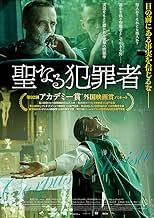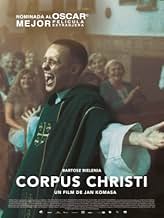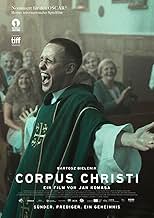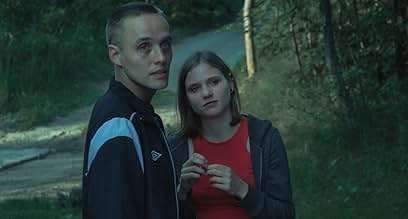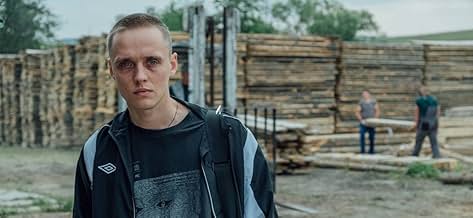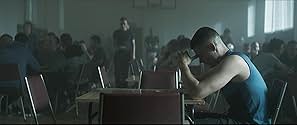NOTE IMDb
7,7/10
23 k
MA NOTE
Daniel fait l'expérience d'une transformation spirituelle dans un centre de détention. Le crime qu'il a commis l'empêche de s'inscrire au séminaire après sa libération conditionnelle, mais i... Tout lireDaniel fait l'expérience d'une transformation spirituelle dans un centre de détention. Le crime qu'il a commis l'empêche de s'inscrire au séminaire après sa libération conditionnelle, mais il n'a pas l'intention d'abandonner son rêve.Daniel fait l'expérience d'une transformation spirituelle dans un centre de détention. Le crime qu'il a commis l'empêche de s'inscrire au séminaire après sa libération conditionnelle, mais il n'a pas l'intention d'abandonner son rêve.
- Réalisation
- Scénario
- Casting principal
- Nommé pour 1 Oscar
- 56 victoires et 41 nominations au total
Lidia Bogaczówna
- Mother
- (as Lidia Bogacz)
Avis à la une
Always disturbing but also worrying and even intermittently amusing, this drama unfurls a religious parabola that is distinctly Polish but open to everyone. Bartosz Bielenia, an actor with blazing blue eyes and the ability to be so still, it's as if he can freeze the frame on his own, stars like Daniel, a young ne'er from Warsaw who is in juvenile detention for crimes only later revealed. He was first seen watching the gate as some teenagers in a metalwork class brutalize a boy while the guard is out, but sheer luck opens another door for him. Drawn to religion but not allowed to join a seminary due to his criminal record, he travels to a rural town once he has been paroled in a sawmill to take up work. A little gray lie allows him to take the identity of the young new priest, Tomasz, that the city expects, and soon Daniel will perform mass and hear confessions, while the old resident curate will drip out in rehabilitation for a while. Around this midpoint, the movie risks sounding like an episode of Father Ted as directed by Robert Bresson, as Daniel / Tomasz gets used to being looked after by bossy matron Lidia (Aleksandra Konieczna) in luxurious new digs and gets to know the city folk. The plot takes an interesting turn when Daniel learns that the family has been traumatized by a horrific road accident and discovers an uncommon pastoral ability when he tries to help restore the battered psyches of the bereaved-many of them barely younger than himself, including the pretty teenage daughter of Lidia, Eliza (Eliza Rycembel). All the above may lead you to expect some sort of soppy redemptive course, but that's not where this film ends up, landing on a much darker, reflective note instead. The blue-tone cinematography of Piotr Sobocinski enhances the rapturous atmosphere and enhances suspense in a smartly written, disturbing job.
"You know what we're good at? Giving up on people. Pointing the finger at them. 'Forgive' doesn't mean 'forget.' It doesn't mean 'pretend nothing happened.' 'Forgive' means 'love.' Love someone despite their guilt. No matter what the guilt is."
Engaging from beginning to end, with a deeply soulful performance from Bartosz Bielenia, the young man who stumbles into impersonating a priest after getting out of juvenile detention. His character brings pragmatic, meaningful spirituality to the town, and tries to help it heal from a tragedy that not only left seven dead, but a woman ostracized. I loved the theme of forgiveness and how hard it is to truly reach this state emotionally, and how it applied to both this poor woman and the imitation priest, who were both in desperate need of it.
The film toes the line between showing religion as a positive influence - making people better individuals and a source of great comfort - and getting a few criticisms in, such as mentioning that it was just a pope along the way who thought celibacy would be a good idea, and "now it's a problem." Mostly though, it shows the power of spirituality to lift people above their baser instincts, and the best moments are those when the young priest wields this power. The scene where he leads a funeral procession down the road and we see the rich mayor washing his car is one of many of this type, and it's stirring.
As much as I liked Eliza Rycembel's performance as a young woman searching for answers in the wake of her brother's death, I wish there hadn't been a growing love between her and the young priest. The film is not without flaws but none of them are too glaring, and director Jan Komasa tells the story well, keeping it engaging from beginning to end. It's solid and one that I'd recommend.
Engaging from beginning to end, with a deeply soulful performance from Bartosz Bielenia, the young man who stumbles into impersonating a priest after getting out of juvenile detention. His character brings pragmatic, meaningful spirituality to the town, and tries to help it heal from a tragedy that not only left seven dead, but a woman ostracized. I loved the theme of forgiveness and how hard it is to truly reach this state emotionally, and how it applied to both this poor woman and the imitation priest, who were both in desperate need of it.
The film toes the line between showing religion as a positive influence - making people better individuals and a source of great comfort - and getting a few criticisms in, such as mentioning that it was just a pope along the way who thought celibacy would be a good idea, and "now it's a problem." Mostly though, it shows the power of spirituality to lift people above their baser instincts, and the best moments are those when the young priest wields this power. The scene where he leads a funeral procession down the road and we see the rich mayor washing his car is one of many of this type, and it's stirring.
As much as I liked Eliza Rycembel's performance as a young woman searching for answers in the wake of her brother's death, I wish there hadn't been a growing love between her and the young priest. The film is not without flaws but none of them are too glaring, and director Jan Komasa tells the story well, keeping it engaging from beginning to end. It's solid and one that I'd recommend.
Peter is a man with serious character defects who has been released from a juvenile facility. He finds himself at a small town Catholic church where he dons a priest's collar and becomes a beloved charismatic leading his adoring flock. The Polish Peyton Place slowly reveals its' secrets as the good "father" hears confessions from the flock and performs masses with inspiring homily's. As a lapsed Catholic, I found the film very realistic and sentimental. The lead actor is excellent and I would place it just behind "Parasite" as the best foreign language movie of 2019.
A simple plot summary (Juvenile delinquent poses as priest, transforms village) does not begin to describe the nuanced and complex moral dilemma explored in "Corpus Christi," Poland's 2019 entry into the Oscar race. Violence, nudity, sexuality, and vulgarity--that in another film might seem gratuitous--here remind us that the world is full of angry people whose religiosity is more rooted in revenge than redemption. The central question: Is the road to love, forgiveness, and salvation more navigable when mapped by a man who wills himself into the priesthood and defies blind obedience than it is when directed by soulless compliance? Prepare yourself for a shocking and perplexing answer. Extraordinary performances, direction, and cinematography.
This is the kind of movie that captivated me from start to finish. The story itself unbelievable as it may seem is actually based on a real story of young man from the Masovian voivodeship. I will not spoil any of it and will just say that 'Corpus Christi' touches on important matters and values and it's main message translates to 'love thy neighbor'. Amazing performance by the main actor and I loved the camera work. Highly recommended by a non-practitioning catholic.
Le saviez-vous
- AnecdotesA fictional story but based on a book exploring the surprisingly common multiple stories of clerical impostors in Poland, a phenomenon more prevalent than even the film-makers themselves expected. Most of Corpus Christi was shot in a remote village in the Carpathian foothills, where the crew soon began to feel that locals were a little cagey when the film's topic was broached. It was only when the shoot was over that they discovered that the village had its very own real history of a bogus priest. The impersonator had gotten away with it for two years before being rumbled.
- ConnexionsFeatured in The Oscars (2020)
Meilleurs choix
Connectez-vous pour évaluer et suivre la liste de favoris afin de recevoir des recommandations personnalisées
- How long is Corpus Christi?Alimenté par Alexa
Détails
Box-office
- Montant brut aux États-Unis et au Canada
- 127 240 $US
- Week-end de sortie aux États-Unis et au Canada
- 4 632 $US
- 16 févr. 2020
- Montant brut mondial
- 9 943 901 $US
- Durée1 heure 55 minutes
- Couleur
- Mixage
- Rapport de forme
- 2.39 : 1
Contribuer à cette page
Suggérer une modification ou ajouter du contenu manquant

Lacune principale
By what name was La communion (2019) officially released in India in Hindi?
Répondre
![Regarder Trailer [OV]](https://m.media-amazon.com/images/M/MV5BNjE0ZDQ4MDMtOWQzMy00NTUzLWExNzYtOWJlNGExNjBlYzAxXkEyXkFqcGdeQXRyYW5zY29kZS13b3JrZmxvdw@@._V1_QL75_UX500_CR0)

